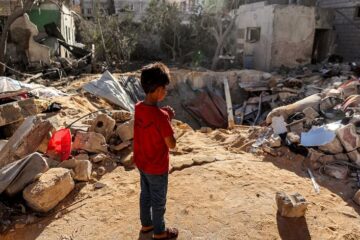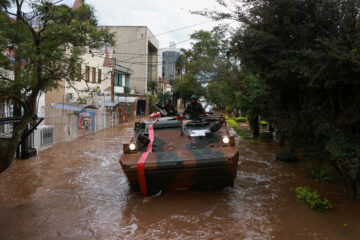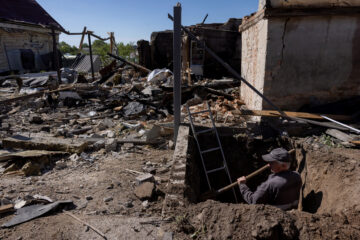Russia and France still differ on Syria
Russia and Western powers remain divided on who was responsible for a chemical weapons attack in Syria, but are continuing to work together toward a United Nations resolution on the removal of Syria\’s chemical arsenal.
Russia has said it still suspected that last month\’s chemical weapons attack in Syria was carried out by rebel forces, despite a report by UN investigators which France said showed the government was behind the attack.
Russian Foreign Minister Sergei Lavrov said Tuesday the attack last month near Damascus was likely a "provocation" by rebels seeking to draw in outside military help.
His French counterpart, Laurent Fabius, told a joint news conference after their meeting in Moscow that evidence presented in a report by U.N. investigators released Monday "seems to leave no doubt" that Syrian forces were the ones who deployed chemical weapons.
United Nations inspectors have confirmed they found "clear and convincing evidence" that poison sarin gas was used in an attack near the Syrian capital of Damascus on 21 August.
In a report issued Monday, inspectors said environmental, chemical and medical samples show "unequivocally and objectively" that "surface-to-surface rockets" containing the nerve agent sarin were used in the Ghouta area of Damascus\’ on August 21.
The report cited survivors who reported "a military attack with shelling," followed by an onset of symptoms including "blurred vision, nausea, vomiting and an eventual loss of consciousness."
The inspectors were asked to determine whether chemical weapons were used, and not who unleashed them.
But the Obama administration said the U.N. report makes it clear that President Bashar al-Assad\’s government was responsible for the attack that Washington says killed more than 1,400 last month. A White House spokesman noted that only the Syrian army has surface-to-surface rockets.
Britain\’s U.N. envoy echoed the comments, saying the report leaves "no remaining doubt" that the Syrian government was responsible for the August 21 attack. Syria maintains it was rebel fighters, not government forces, who were responsible.
Almost all of the biomedical samples examined tested positive for sarin exposure, including 93 percent collected from urine and 88 percent from blood. A majority of the rockets or rocket fragments recovered also were found to be carrying sarin.
U.N. chief Ban Ki-moon called the use of chemical weapons in Syria a "war crime" and demanded the threat of sanctions to support a plan to destroy the arms. He said the August 21 attack is the "most significant use of chemical weapons" since former Iraqi president Saddam Hussein ordered their use against the Kurdish town of Halabja in 1988.
In Geneva, the U.N. Commission of Inquiry on Syria said it is investigating 14 alleged attacks with chemical weapons or chemical agents in Syria over the last two years. The report is expected to add momentum to a deal to eradicate Syria\’s chemical weapons program.
Earlier Monday, the U.S., France and Britain agreed on the need for a strong United Nations resolution that sets precise and binding deadlines for Syria to give up its chemical weapons.
British Foreign Secretary William Hague said the task is difficult and complex, but he stressed the need to maintain pressure on President Bashar al-Assad\’s government.
"It is the Assad regime that has stockpiled these weapons and that has used them repeatedly against the Syrian people, so the pressure is on them to comply with this agreement in full. The world must be prepared to hold them to account if they don\’t, and our three countries are certainly determined to do so."
Hague spoke alongside French Foreign Minister Laurent Fabius and U.S. Secretary of State John Kerry after they met in Paris. The talks came days after the U.S. and Russia announced a plan that calls on Syria to detail its chemical weapons stockpile. The Syrian government has promised to comply.
Kerry said anything less than full compliance by the Syrian government with a U.N. resolution will not be accepted. He also expressed the need to find a lasting solution beyond taking chemical weapons away from Assad\’s forces.
"We understand that removing the chemical weapons still leaves him with artillery and airplanes and he uses them indiscriminately against his people, and we are going to do everything in our power to continue to work towards the political resolution that is so critical to ending that violence."
Earlier efforts to address the Syrian crisis at the U.N. Security Council have failed, with Russia and China using their veto power to block any outside intervention.
The United States says more than 1,400 people were killed in the attack, which the U.S. says was carried out by the Syrian military. The Assad government blames rebels for carrying out the attack.
More than 100,000 people have been killed in the conflict, and the UN refugee agency says about one third of Syria\’s pre-war population of 20.8 million have fled their homes, either to other countries or safer areas within Syria.
Source: Agencies
[do_widget_area inner_adsbar]











